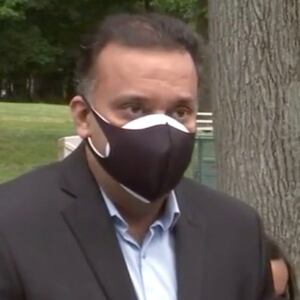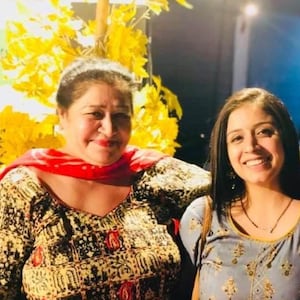Kiran Shukla of New Jersey is only one of hundreds of U.S. visa holders stranded in their native India after traveling there to attend to a dying parent in this time of COVID-19.
But she may be the only one who then has been kept from attending to a spouse back home who became critically ill and died in her forced absence. She had to watch a YouTube livestream from 7,300 miles away as her American-born 19-year-old son, Samyak Shukla, participated in funeral and cremation rites for her 49-year-old husband, Jitendra Shukla.
“That was my first time with any kind of funeral or cremations or any religious dealing with a body,” Samyak told The Daily Beast. “I just did what I was told.”
ADVERTISEMENT
Back on April 5 when Samyak and his father drove Kiran to Newark Airport, she had not imagined that she was seeing her husband for the very last time.
“She had no clue,” Samyak recalled. “Other than saying goodbye through hugs, there was nothing else that was said.”
Kiran then flew off to tend to her father, who was in Mumbai, nearing the end of a long fight with brain cancer.
“She wanted to see her father a last time,” Samyak said.
Kiran’s father died of cancer on April 17, as India was being hit with a devastating surge in COVID-19 that caused many people to forget all other illnesses. The 5 million new COVID cases recorded in India that month included Kiran, along with her mother, sister, and brother-in-law.
“Everybody got COVID,” Samyak said.
All the adults were hospitalized save for Kiran, who took care of her 3-year-old niece. The girl’s father was the only one who did not survive.
“She doesn’t know that her father is no more,” Samyak reported. “Explaining that to a 3-year-old would be close to impossible if you ask me. One day, she’s going to grow up and say, ‘Look at all these kids, they have dads. Where's my dad?’”
Jitendra had been unable to do anything for his wife but worry from afar in New Jersey. He was greatly relieved when she made a complete recovery and tested negative.
Then, on May 8, Jitendra grew suddenly ill with liver failure, another of the many illnesses eclipsed by fear of COVID-19. Samyak called an ambulance that took his father to JFK Medical Center In Edison. His next call was to his mother and she became the one to worry.
Jitendra was sedated upon his arrival and remained unconscious as he began to suffer multiple organ failure. He tested negative for COVID-19 at the hospital, just as Kiran had in India. But the virus was still what prevented her from catching the next available plane to be at his side.
The Biden administration had imposed a ban on travel from India effective on May 4. It does allow for emergencies but Kiran would still need her visa stamped in order to fly home. And that had to be done in India at the U.S. Embassy or one of the consulates, all of which had been shut down due the virus.
The family appealed to U.S. officials for an exception..
“No luck,” Samyak said.
On the night of May 10, Samyak received an urgent call from the hospital.
“They said, ‘His oxygen levels are dropping and he doesn't have much time left, you need to come right now,’” the son recalled.
He raced to the hospital only to be told he had come to the wrong entrance for patients' family members.
“They’re like, ‘You can’t go in this way,’” Samyak recalled, “I had to tell them, ‘Listen, my dad does not have even to the end of the day, so I need to get up and see him one last time. Can you do that for me at least?’”
He was allowed inside and he dashed to the coronary care unit, arriving in his father’s very last moments.
“One minute before his heart stopped,” Samyak recalled.
What his mother could not have imagined when they dropped her at the airport in April had come to pass in May.
“I had to call her after that and tell her,” Samyak said.
Jitendra had never regained consciousness and died without learning what would have in other circumstances been wonderful news to pass on to Kiran.
Back in 2000, when Jitendra and Kiran first arrived in America, they had immediately applied for green cards.
“It was my dad’s dream to come to the U.S.,” Samyak said. “He wanted a different life. He wanted to see what it’s like, the lifestyle of the U.S. So, he did what he could to be there. And he got here with academics.”
Kiran had come along because that was what her husband wanted.
“One day, my dad was just like, ‘We’re going to America,’ and she was like, ‘Okay,’” Samyak said.
Jitendra’s degree in electronics had enabled him to get a work visa. He had then decided there was more promise in tech and worked his way up to becoming an IT project manager.
Due to the glacial pace of government, the green card had still not come through when the global financial crisis of 2008 required him to attend to some personal matters in India. A departure from the United States, however brief, reset the clock on the green card and he still had not received it in January of this year, when he was laid off from a company where he had worked for 12 years. That, in turn, threatened his immigration status.
But he had signed on with a software solutions network called OneCore and remained on track to get his green card. A notification that it was being approved at long, long last only came after he had fallen too ill to register its significance.
“Something he was waiting for 20 years finally came through, but then he was no more,” Sanyak said. “So he died without ever being a U.S. citizen. He was waiting for that for so long.”
The green card had not actually been issued when Jitendra died, and there was some question as to whether Kiran’s visa would be revoked and her own chances for a green card dashed now that the primary holder was dead.
Even if her visa remained valid, she would continue to be stranded in India until she could get it stamped. And the next available appointments were not until February 2022.
On May 12, Kiran watched live on YouTube, as her husband lay in an open coffin in a New Jersey funeral parlor, his head resting on a pristine white pillow, surrounded by garlands and rose petals. He was flanked by the flags of India and America.
Samyak was coached through the traditional rituals with the help of a family friend who translated instructions from the presiding pundit.
The YouTube stream continued at a crematorium, where Samyak circled the coffin three times, trickling in water, as instructed. A crematorium worker was able to guide him in English as the coffin was wheeled up to the oven.
“You can help push it in,” the worker said.
Samyak did as bid. He then joined the other mourners behind a glass partition and pushed a button. The oven door closed and the cremation commenced.
His mother was still in India, and Samyak emailed U.S. consular officials in India on May 14:
<p><em>Greetings all,</em><em>Allow me to formally introduce myself. My name is Samyak Jitendra Shukla, son and the only child of Kiran Jitendra Shukla. Recently, my father had passed away due to multiorgan system failure to which my mother was denied the chance of even being able to lay eyes on him in person one last time. She had already been addressing issues affiliated with the limited life span that her father had left from his brain tumor along with the unexpected demise of her brother-in-law from the coronavirus in India.”</em><em>He went on, “This situation in its entirety consists of the death of three family members in the past month. Not to mention, the travel ban and her current immigration status has coerced her to be stranded and left in a situation where she cannot come back to visit me (the 19-year old son). I kindly request that action and other necessary procedures are carried out to grant my mother entry back into the United States of America. I genuinely need my mother during these difficult times. Please consider this proposal having taken into mind all the factors that were mentioned.</em></p>
With regards, Samyak Jitendra Shukla.
He received only an automated reply.
“So, I don’t think they even read it,” he told The Daily Beast.
He and his mother also tried reaching out to various other officials, including U.S. Sen Corey Booker.
“No luck there,” Samyak reported
His mother—who declined an interview request from The Daily Beast—then got a response from the office of their congressman, U.S. Rep. Frank Pallone. He happens to be co-founder of the Congressional Caucus on India and Indian Americans.
“My heart goes out to Ms. Shukla for the tragic loss of her father and husband,” Pallone told The Daily Beast on Wednesday. “My office has been actively working to assist her in returning to New Jersey to be with her son during this difficult time. We’re working closely with federal agencies to find the best possible avenue for her return to the U.S.”
Meanwhile, Kiran and Samyak are attending to various practical matters—bills and their house and his college tuition—despite her being stranded so far away. Samyak is seeking to provide some financial stability with what he earns in a company’s logistics department. He figures he will be able to do more once he receives his degree in computer science.
“I'm trying to help my mom as best I can,” he said.








